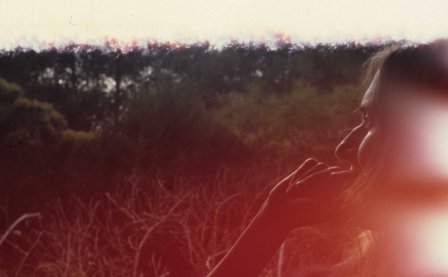When I saw Josephine Foster perform this May in Athens, she seemed for the entire night to wonder why a roomful of people would pay good money to watch her perform some simple songs she had written. She was friendly, genuine, and graceful – all the things one would expect after hearing her music – when some friends and I spoke to her before the show, but she also seemed surprised that strangers would walk up and introduce themselves to her just because they enjoy her work. On stage, she kept her banter to a minimum, and when she did talk, it was to the end of demystifying her music: she introduced "Stone's Throw from Heaven" as a little tune she put together on the fly during her last stay in Georgia. During the one song she played with accompanists, Foster invited members of the audience to grab any instruments they might have handy and join her and her bandmates on stage; when the two folks who accepted returned to their seats at the song's end, I got the sense that she wished the wall between observer and performer would remain down for the rest of the night.
Foster did not, significantly, play any songs from A Wolf in Sheep's Clothing that evening, despite the fact that it was the album for which she was ostensibly touring. While both cursory and in-depth listens reveal that the album is by no stretch at odds with the singer's previous recordings, it is the first of Foster's albums to feel like a closed space, to create its own consistent environment. You could chalk it up to the fact that Wolf was recorded in a church – albums made in sanctuaries (think Talk Talk's Laughing Stock) are often more anchored to their sites of genesis than others. But Wolf is also a concept-driven project: it's a collection of seven German lieder, songs for voice and instruments often credited as the modern pop song's late 19th century ancestors. The American folk stylings and personable lyrics typical of Foster's previous albums provide multiple points of immediate contact for Joe Concertgoer, whereas a Brahms piece has more potential to alienate or disengage, even when played without the intention of doing so.
But I think there's another reason that Foster may be wary and perhaps even afraid of playing any of Wolf's songs live: this record makes her sound special. I've never heard anyone deny Foster's talents, but I have seen many reviewers and friends shrug her songs off as second-tier fare. Fair enough, I suppose: if you compare her original material to Devendra Banhart's or Joanna Newsom's (and we always end up doing this), Foster's arrangements sound less full and her lyrics appear less idiosyncratic. In short, she's had as good a voice but not as unique a Voice as her contemporaries.
On this album, though, Foster uses other people's songs to come into her own as a performer and interpreter, outshining her peers on a number of levels. You could chalk it up to better source material, but then you'd ignore other areas of growth. For starters, Foster's more economical than ever on this outing. Singing in a lullaby cadence, she stretches notes to their limits, often projecting emotions as varied as bittersweet nostalgia, serenity, melancholy, and deep-seated joy over the course of a single word by relishing each phoneme. Her harp provides appropriately baroque accompaniment, gracefully filling each measure with as much sound as possible.
Guest guitarist Brian Goodman might be most responsible for taking Wolf to the next level. He first chimes in at the end of opener "An die Musik," launching into a noodly, clean tone electric outro that adds a trippy, psychedelic aftertaste to a performance that otherwise sounds like it could have happened when the piece was originally written. Goodman's contributions grow on each successive track, culminating during Schumann's "Auf einer Burg," a heavily textured, free-form spin cycle of guitar drift that rivals the SYR series' most disembodied moments in its surrealism. This track should connect some crucial dots for anyone who's ever wondered why so many listeners of seemingly genteel singers like Foster or Newsom also have an appetite for blistering, chaotic artists like Mouthus and Hair Police.
Wolf's avant-garde wanderings are quite interesting in light of how its songs have been received over the past century. When Cecil Sharp, Ralph Vaughan Williams, and other middle-class scholars, composers, and society people revived English folk forms in the early 20th century, purging the common man's consciousness of German lieder was one of their primary goals, as they regarded these songs as fleeting, insubstantial scraps of popular drivel. This revivalist project would establish the milieu from which Fairport Convention, The Incredible String Band, and other acts who mixed pop with traditional British folk would rise a few decades later. And now an American artist who travels in a circuit that is often derided as a mere reprisal of this late '60s psych-folk scene has made an album full of these once-despised lieder for a general public that will likely regard her recording as inaccessible or even pretentious. Neo-folkies like Foster are often criticized for drawing too heavily from the past, but a look beneath the surface reveals that their albums are sites for rewriting and reevaluating received topographies of pop music history. And A Wolf in Sheep's Clothing is the most compelling reinterpretation I've heard in some time. 1. An die Musik 2. Der König in Thule 3. Verschwiegene Liebe 4. Die Schwestern 5. Wehmut 6. Auf einer Burg 7. Nähe des Geliebten
More about: Josephine Foster




